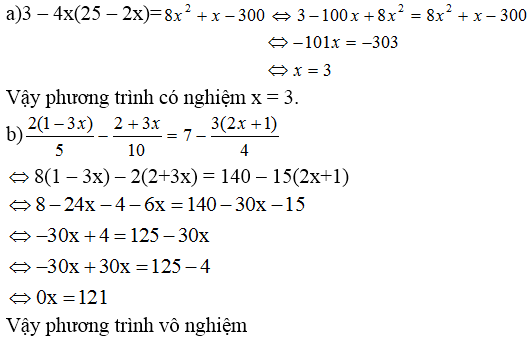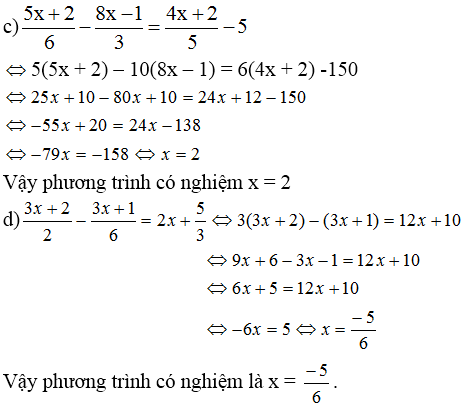Hãy nhập câu hỏi của bạn vào đây, nếu là tài khoản VIP, bạn sẽ được ưu tiên trả lời.

a,\(4x\left(2x+3\right)-x\left(8x-1\right)=5\left(x+2\right)\)
\(< =>8x^2+12x-8x^2+x=5x+10\)
\(< =>13x=5x+10< =>8x=10\)
\(< =>x=\frac{10}{8}=\frac{5}{4}\)
b, \(\left(3x-5\right)\left(3x+5\right)-x\left(9x-1\right)=4\)
\(< =>9x^2-25-9x^2+x=4\)
\(< =>x=4+29=33\)
c,\(3-4x\left(25-2x\right)=8x^2+x-300\)
\(< =>3-100x+8x^2=8x^2+x-300\)
\(< =>x+100x=3+300\)
\(< =>101x=303< =>x=\frac{303}{101}=3\)
d,\(2\left(1-\frac{3x}{5}\right)-\frac{2+3x}{10}=7-\frac{3\left(2x+1\right)}{4}\)
\(< =>2-\frac{6x}{5}-\frac{2+3x}{10}=7-\frac{6x+3}{4}\)
\(< =>-\frac{24x}{20}-\frac{4+6x}{20}+\frac{30x+15}{20}=5\)
\(< =>\frac{30x-6x-24x+15-4}{20}=5\)
\(< =>\frac{11}{5}=5< =>11=25\)(vo li)

Bài 2:
a) Thay x=-2 vào phương trình 2x+k=x-1, ta được
2*(-2)+k=-2-1
⇔-4+k=-3
⇔k=-3-(-4)=-3+4=1
Vậy: Khi k=1 thì phương trình 2x+k=x-1 có nghiệm là x=-2
b) Thay x=2 vào phương trình (2x+1)(9x+2k)-5(x+2)=40, ta được
(2*2+1)*(9*2+2k)-5*(2+2)=40
⇔5*(18+2k)-20=40
⇔5*(18+2k)=40+20
⇔18+2k=12
⇔2k=12-18=-6
⇔k=-3
Vậy: khi k=-3 thì phương trình (2x+1)(9x+2k)-5(x+2)=40 có nghiệm là x=2
c) Thay x=1 vào phương trình 2(2x+1)+18=3(x+2)(2x+k), ta được
2*(2*1+1)+18=3*(1+2)*(2*1+k)
⇔2*3+18=3*3*(2+k)
⇔24=9*(2+k)
⇔\(2+k=\frac{24}{9}=\frac{8}{3}\)
\(\Leftrightarrow k=\frac{8}{3}-2=\frac{2}{3}\)
Vậy: khi \(k=\frac{2}{3}\) thì phương trình 2(2x+1)+18=3(x+2)(2x+k) có nghiệm là x=1

Tìm x:
1. 3x (2x + 3) - (2x + 5).(3x - 2) = 8
\(\Leftrightarrow6x^2+9x-6x^2+4x-15x+10=0 \)
\(\Leftrightarrow-2x+10=0\Leftrightarrow x=5\)
Vậy x = 5
2. 4x (x -1) - 3(x2 - 5) -x2 = (x - 3) - (x + 4)
\(\Leftrightarrow4x^2-4x-3x^2+15-x^2=x-3-x-4\)
\(\Leftrightarrow-4x+15=-7\)
\(\Leftrightarrow-4x=-22\Leftrightarrow x=\frac{11}{2}\)
Vậy x = \(\frac{11}{2}\)
3. 2 (3x -1) (2x +5) - 6 (2x - 1) (x + 2) = -6
\(\Leftrightarrow2\left(6x^2+15x-2x-5\right)-6\left(2x^2+4x-x-2\right)=-6\)
\(\Leftrightarrow12x^2+30x-4x-10-12x^2-24x+6x+12=-6\)
\(\Leftrightarrow8x=-8\Leftrightarrow x=-1\)
Vậy x = -1
4. 3 ( 2x - 1) (3x - 1) - (2x - 3) (9x - 1) - 3 = -3
\(\Leftrightarrow3\left(6x^2-2x-3x+1\right)-18x^2+2x+27x-3-3=-3\)
\(\Leftrightarrow18x^2-6x-9x+3-18x^2+2x+27x-6=-3\)
\(\Leftrightarrow14x=0\Leftrightarrow x=0\)
Vậy x = 0
5. (3x - 1) (2x + 7) - ( x + 1) (6x - 5) = (x + 2) - (x - 5)
\(\Leftrightarrow6x^2+21x-2x-7-6x^2+5x-6x+5=7\)
\(\Leftrightarrow18x=9\Leftrightarrow x=\frac{1}{2}\)
Vậy x = \(\frac{1}{2}\)
6. 3xy (x + y) - (x + y) (x2 + y2 + 2xy) + y3 = 27
\(\Leftrightarrow3x^2y+3xy^2-\left(x+y\right)^3+y^3=27\)
\(\Leftrightarrow3x^2y+3xy^2-x^3-y^3-3x^2y-3xy^2+y^3=27\)
\(\Leftrightarrow-x^3=27\)
\(\Leftrightarrow x=-3\)
Vậy x = -3
7. 3x (8x - 4) - 6x (4x - 3) = 30
\(\Leftrightarrow24x^2-12x-24x^2+12x=30\)
\(\Leftrightarrow0=30\) ( vô lý)
Vậy pt vô nghiệm
8. 3x (5 - 2x) + 2x (3x - 5) = 20
\(\Leftrightarrow15x-6x^2+6x^2-10x=20\)
\(\Leftrightarrow5x=20\Leftrightarrow x=4\)
Vậy x = 4

1) a) \(\left(3x-1\right)\left(9x^2+3x+1\right)-4x\left(x-5\right)\)
\(=27x^3+9x^2+3x-9x^2-3x-1-4x^2+20x\)
\(=27x^3+\left(9x^2-9x^2-4x^2\right)+\left(3x-3x+20x\right)+\left(-1\right)\)
\(=27x^3-4x^2+20x-1\)
b)\(\left(7x+2\right)\left(3-4x\right)-\left(x+3\right)\left(x^2-3x+9\right)\)
\(=21x-28x^2+6-8x-x^3+3x^2-9x-3x^2+9x-27\)
\(=\left(21x-8x-9x+9x\right)+\left(-28x^2+3x^2-3x^2\right)\)\(+\left(6-27\right)\)\(+\left(-x^3\right)\)
\(=13x-28x^2-21-x^3\)
c)\(\left(4x+3\right)\left(4x-3\right)-\left(2-x\right)\left(4+2x+x^2\right)\)
\(=16x^2-12x+12x-9-8-4x-2x^2+4x+2x^2+x^3\)
\(=\left(16x^2-2x^2+2x^2\right)+\left(-12x+12x-4x+4x\right)\)\(+\left(-9-8\right)\)\(+x^3\)
\(=16x^2-17+x^3\)
d)\(\left(3x-8\right)\left(-5x+6\right)-\left(4x+1\right)\left(3x-2\right)\)
\(=-15x^2+18x+40x-48-12x^2+8x-3x+2\)
\(=\left(-15x^2-12x^2\right)+\left(18x+40x+8x-3x\right)\)\(+\left(-48+2\right)\)
\(=-27x^2+63x-46\)
e)\(\left(3x-6\right)4x-2x\left(3x+5\right)-4x^2\)
\(=12x^2-24x-6x^2-10x-4x^2\)
\(=\left(12x^2-6x^2-4x^2\right)+\left(-24x-10x\right)\)
\(=2x^2-34x\)
f)\(\left(5x-6\right)\left(6x-5\right)-x\left(3x+10\right)\)
\(=30x^2-25x-36x+30-3x^2-10x\)
\(=\left(30x^2-3x^2\right)+\left(-25x-36x-10x\right)+30\)
\(=27x^2-71x+30\)
2) a)\(x\left(x+3\right)-x^2=6\)
\(\Rightarrow x^2+3x-x^2=6\)
\(\Rightarrow\left(x^2-x^2\right)+3x=6\)
\(\Rightarrow3x=6\)
\(\Rightarrow x=2\)
Vậy x=2
b) \(2x\left(x-5\right)+x\left(-2x-1\right)=6\)
\(\Rightarrow2x^2-10x-2x^2-x=6\)
\(\Rightarrow\left(2x^2-2x^2\right)+\left(-10x-x\right)=6\)
\(\Rightarrow-11x=6\)
\(\Rightarrow x=-\dfrac{6}{11}\)
\(\)Vậy \(x=-\dfrac{6}{11}\)
c) x(x+5)-(x+1)(x-2)=7
\(\Rightarrow x^2+5x-x^2+2x-x+2=7\)
\(\Rightarrow\left(x^2-x^2\right)+\left(5x+2x-x\right)=7-2\)
\(\Rightarrow6x=5\)
\(\Rightarrow x=\dfrac{5}{6}\)
Vậy x=\(\dfrac{5}{6}\)
d)\(\left(3x+4\right)\left(6x-3\right)-\left(2x+1\right)\left(9x-2\right)=10\)
\(\Rightarrow18x^2-9x+24x-12-18x^2+4x-9x+2=10\)
\(\Rightarrow\left(18x^2-18x^2\right)+\left(-9x+24x+4x-9x\right)+\left(-12+2\right)=10\)
\(\Rightarrow10x-10=10\)
\(\Rightarrow10x=20\)
\(\Rightarrow x=2\)
Vậy x=2


a. \(3-4x\left(25-2x\right)-8x^2+x-300=0\)
\(\Leftrightarrow3-100x+8x^2-8x^2+x-300=0\)
\(\Leftrightarrow-297-99x=0\)
\(\Leftrightarrow x=3\)
Vậy \(n_0\) của PT là: x=3
b. \(\Leftrightarrow\frac{\left(2-6x\right)}{5}-2+\frac{3x}{10}=7-\frac{3x+3}{4}\)
\(\Leftrightarrow\frac{\left(4-12x\right)}{5}-\frac{20}{10}+\frac{3x}{10}=\frac{\left(28-3x-3\right)}{4}\)
\(\Leftrightarrow\frac{\left(-16-9x\right)}{10}=\frac{\left(25-3x\right)}{4}\)
\(\Leftrightarrow-64-36x=250-30x\)
\(\Leftrightarrow-6x=314\)
\(\Leftrightarrow x=-\frac{157}{3}\)
Vậy -\(n_0\) của PT là: \(x=\frac{-157}{3}\)
c. \(5x+\frac{2}{6}-8x-\frac{1}{3}=4x+\frac{2}{5}-5\)
\(\Leftrightarrow-3x=4x-\frac{23}{5}\)
\(\Leftrightarrow7x=\frac{23}{5}\)
\(\Leftrightarrow x=\frac{23}{35}\)
Vậy \(n_0\) của PT là: \(x=\frac{23}{35}\)
d. \(3x+\frac{2}{3}-3x+\frac{1}{6}=2x+\frac{5}{3}\)
\(\Leftrightarrow\frac{5}{6}=2x+\frac{5}{3}\)
\(\Leftrightarrow x=-\frac{5}{12}\)
Vậy \(n_0\) của Pt là: \(x=-\frac{5}{12}\)